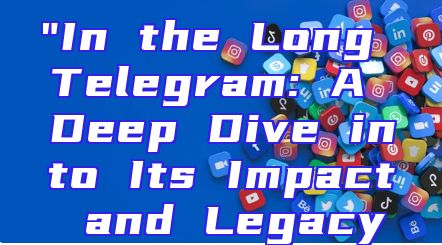"In the Long Telegram: A Deep Dive into Its Impact and Legacy
来源:本站时间:2025-07-06 05:53:58
The Long Telegram, a 1946 analysis by George Kennan, is a pivotal piece in the study of Cold War politics. This article explores its origins, contents, and enduring influence on American foreign policy. We delve into Kennan's strategic vision, the concept of containment, and its relevance in today's geopolitical landscape. Through historical analysis and contemporary perspectives, we assess the Long Telegram's significance in shaping the Cold War era and its enduring legacy.
The Long Telegram was a 5,000-word dispatch sent by George Kennan, a U.S. diplomat, to the Department of State from Moscow in 1946. It outlined his views on the Soviet Union and its foreign policy, and proposed a long-term strategy for dealing with the Soviet threat. The document is renowned for its depth and foresight, offering a comprehensive analysis of Soviet intentions and capabilities.
At the heart of the Long Telegram is Kennan's concept of containment, which proposed a policy of using political, economic, and military means to prevent the spread of communism. This approach was instrumental in shaping U.S. foreign policy during the Cold War, leading to the creation of alliances like NATO and the Marshall Plan.
This article examines the origins of the Long Telegram, starting with Kennan's background and experiences in the Soviet Union. We look at the historical context of the post-World War II period, including the rise of the Soviet Union and the fear of communism spreading globally. Kennan's insights into Soviet psychology and strategy are explored, highlighting his belief that the Soviet Union was driven by an expansionist impulse and a desire to spread its ideology.
The article then delves into the concept of containment and its implementation. We analyze the political, economic, and military strategies employed by the United States to contain the spread of communism, including the establishment of alliances, economic aid programs, and military interventions. The impact of these strategies on the Cold War is discussed, focusing on key events such as the Korean War, the Cuban Missile Crisis, and the Vietnam War.
In addition to historical analysis, the article examines the Long Telegram's relevance in today's geopolitical landscape. We explore how Kennan's strategic vision and the concept of containment continue to influence contemporary foreign policy debates. This includes discussions on the current state of U.S.-Russian relations, the rise of China as a global power, and the challenges of countering ideological threats.

Furthermore, the article assesses the Long Telegram's enduring legacy, including its impact on the study of international relations and the evolution of American foreign policy. We discuss the debates surrounding Kennan's theories, with some critics arguing that containment led to unnecessary conflicts and others praising its effectiveness in preventing the spread of communism.
In conclusion, the Long Telegram is a critical document in the study of Cold War politics and American foreign policy. Its origins, contents, and enduring influence are explored in this article, providing a comprehensive analysis of its significance in shaping the Cold War era and its relevance in today's world.